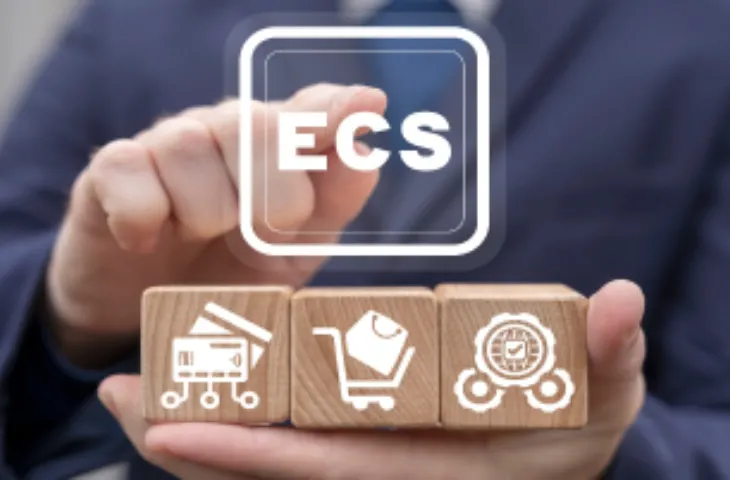In modern banking, large-scale payments and collections cannot be managed efficiently using cheques or demand drafts. To make bulk transactions faster and more reliable, banks use the Electronic Clearing System (ECS). It is widely used for paying salaries, pensions, dividends, EMIs, and utility bills. For bank exam aspirants, ECS is an important topic under payment systems.
What is Electronic Clearing System (ECS)?
The Electronic Clearing System (ECS) is an electronic mode of transferring funds between bank accounts. It is used for bulk transactions, either for making payments (ECS Credit) or collecting payments (ECS Debit).
- ECS is regulated by the Reserve Bank of India (RBI).
- It helps businesses, government departments, and individuals process repetitive transactions smoothly.
- It reduces paperwork, delays, and the risk of cheque bounce.
Key Features of ECS
- Handles bulk transactions electronically.
- Useful for repetitive and periodic transactions.
- Safe, fast, and reduces manual intervention.
- Cost-effective compared to physical instruments.
Types of ECS
ECS is mainly divided into two categories:
| Type of ECS | Purpose | Example |
| ECS Credit | Used when institutions want to make bulk payments to multiple recipients. | Salary, Pension, Dividend distribution |
| ECS Debit | Used when institutions need to collect recurring payments from customers. | Loan EMIs, Insurance premiums, Utility bills |
Uses of ECS in the Banking Sector
ECS is a backbone for recurring transactions in India’s banking system.
- Salary & Pension Payments – Companies and government bodies use ECS Credit for disbursing monthly payments.
- Loan & EMI Collections – Banks use ECS Debit to collect EMIs automatically from borrowers’ accounts.
- Bill Payments – Utility companies (electricity, water, gas, telecom) collect bills through ECS Debit.
- Dividend & Refunds – Companies use ECS Credit to transfer dividends or refunds directly to investors.
ECS vs NEFT vs RTGS vs IMPS
Bank exam questions often compare ECS with other electronic payment methods.
| Parameter | ECS | NEFT | RTGS | IMPS |
| Purpose | Bulk periodic payments/collections | One-to-one fund transfer | High-value real-time transfer | Instant fund transfer |
| Speed | Batch processing (T+1 basis) | Hourly settlement | Real-time | Real-time (24×7) |
| Value Limit | No limit but used for repetitive transactions | No minimum, no maximum | Min ₹2 lakh | Up to ₹5 lakh |
| Best Use | Salary, EMIs, bills | General transfers | Large, urgent transfers | Instant small/medium transfers |
Process of ECS Transaction
- The institution/company submits an ECS mandate to its bank.
- The bank uploads transaction details to the clearing house.
- Clearing house processes and shares instructions with destination banks.
- The recipient’s/customer’s account is credited (ECS Credit) or debited (ECS Debit).
Validity of ECS Mandate
- An ECS mandate (customer’s permission to debit their account) is usually valid for a specific period or until revoked.
- Customers can cancel or modify ECS mandates by submitting a written request to their bank.
Advantages of ECS
ECS benefits banks, businesses, and customers alike.
Benefits to Customers:
- No need to issue multiple cheques.
- Timely payment/credit ensures convenience.
- Safe and automated process.
Benefits to Institutions:
- Reduces paperwork and cost of issuing cheques.
- Bulk payments/collections made quickly.
- Ensures timely settlement.
Benefits to Banks:
- Reduces cheque clearing workload.
- Promotes electronic banking.
- Enhances efficiency in handling bulk payments.
Limitations of ECS
- ECS settlement is not real-time (T+1).
- Risk of transaction failure if insufficient funds.
- Requires accurate mandate and bank details.
- Gradually being replaced by NACH (National Automated Clearing House), which is faster and more efficient.
FAQs
Electronic Clearing System (ECS) is an RBI-regulated electronic payment system used for bulk transactions like salary, pension, EMIs, and bill payments.
There are two types of ECS: ECS Credit (bulk payments like salaries, dividends) and ECS Debit (bulk collections like EMIs, utility bills).
ECS is used for bulk periodic transactions, while NEFT, RTGS, and IMPS are used for one-to-one fund transfers, usually faster and real-time.
An ECS mandate remains valid for a specific period (decided by customer or institution) and can be cancelled anytime with a written request to the bank.
ECS works on batch processing with T+1 settlement, while NACH (National Automated Clearing House) is faster, operates on the same day, and has wider coverage.
- IBPS RRB PO Mains Scorecard 2026 Out for Scale II & III, Download Link
- OICL Assistant Cut Off 2026 Out, Prelims & Mains Category-wise Marks
- IBPS RRB Clerk Prelims Scorecard 2026, Office Assistant Result Out
- IBPS RRB PO Interview Shift Timings 2025, Check the Schedule
- IBPS RRB PO Interview Marks 2025-26, Detailed Mark Calculations
- IBPS RRB PO Interview Date 2025-26, Check Complete Schedule
Hi, I’m Tripti, a senior content writer at Oliveboard, where I manage blog content along with community engagement across platforms like Telegram and WhatsApp. With 3+ years of experience in content and SEO optimization related to banking exams, I have led content for popular exams like SSC, banking, railways, and state exams.
